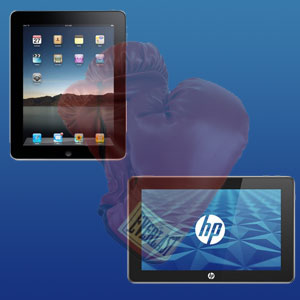 The Microsoft following media has been tripping over itself this week, seemingly discounting the iPad as too bulky, too clunky, too simple. Some have even pointed to HP’s Slate as the superior device. Lucky for us, details on the specifications have leaked out thanks to Engadget, so we’re able here at Technologizer to compare the two platforms based on what we know. From what has been disclosed so far, it still certainly seems to be advantage Apple, and here’s why.
The Microsoft following media has been tripping over itself this week, seemingly discounting the iPad as too bulky, too clunky, too simple. Some have even pointed to HP’s Slate as the superior device. Lucky for us, details on the specifications have leaked out thanks to Engadget, so we’re able here at Technologizer to compare the two platforms based on what we know. From what has been disclosed so far, it still certainly seems to be advantage Apple, and here’s why.
1. Windows 7 is NOT a operating system made for touch-based devices. One of the most common criticisms of the iPad I’ve seen has been the operating system itself. While I tend to agree the user interface does need some tweaks, putting a full-on OS on these type of devices just doesn’t work. No matter how convenient it is to be able to run a full Windows app on a device like this, they aren’t built for the touch world. The interactivity gained through gestures and the like is lost on a mouse-based UI and no skin will correct that. Add to this the limitations of the hardware and such a feature becomes useless.
2. It’s not lighter (or much smaller) than the iPad. Paul Thurrott in his review criticized the iPad for its weight. Having actually picked up and played with the device myself, I believe this criticism is unwarranted. Yes, it has *a little* bit of weight to it, but this isn’t a handheld device necessarily. It’s meant to be cradled, put in your lap. Don’t look to the HP Slate to be lighter. The difference there is negligible, and its only slightly smaller and a bit thicker than the iPad. I sure hope the HP device gets the same treatment in its own review.
3. It’s not necessarily cheaper than Apple’s device. I must admit I chuckled here as I wrote this. When was the last time Apple actually competed on price? At least initially, they will beat HP here. At $499, Apple’s entry 16GB model will be cheaper, although HP’s low-end device will be 32GB at $549, $50 cheaper than Apple’s version. One has to assume however than running Windows 7 will certainly take up a good deal of space, so how much of an advantage will the space difference really be?
4. Battery life is half that of the iPad. We’ve seen confirmation out in the field that Apple’s claims of long battery life do seem pretty close to reality. Therefore, it should concern any prospective HP Slate owner that the company itself is only claiming battery life that is half of its Apple counterpart. Again, hate to harp on it but this is a desktop OS at work again. This software requires more processing and computing power, and thus more electrical power. It’s that simple, really.
5. HP does not have a solid stable of third-party applications for its device. Herein lies the beauty of the iPad. Apple has already lined up a cadre of developers behind its iPhone platform, and many of them are already rushing (or have out) applications built for the larger screen and added functionality of the iPad. To my knowledge, HP does not have anything near this, nor does it have plans to. The value proposition of the Slate seems especially lost here.
Does the Slate best Apple? Yes, in a few spots — notably the forward and outward facing cameras, and the memory expansion slot. But it seems more of a reaction to Apple’s latest move than an response. Reactionary devices rarely do well.
 As soon as Apple announced iPhone OS 4 last Thursday, I was itching to get my hands on it–and it wasn’t long before I installed the Developer beta on my iPhone 3GS.
As soon as Apple announced iPhone OS 4 last Thursday, I was itching to get my hands on it–and it wasn’t long before I installed the Developer beta on my iPhone 3GS.


